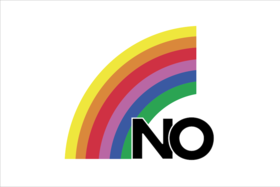No!
| Movie | |
|---|---|
| German title | No! |
| Original title | No |
| Country of production | Chile , United States , France |
| original language | Spanish |
| Publishing year | 2012 |
| length | 118 minutes |
| Age rating | FSK 6 |
| Rod | |
| Director | Pablo Larraín |
| script | Pedro Peirano |
| production | Pablo Larraín |
| music | Carlos Cabezas |
| camera | Sergio Armstrong |
| cut | Andrea Chignoli |
| occupation | |
| |
No! (Original title: No ) is a feature film by the Chilean director Pablo Larraín from 2012. The film is based on the unpublished play El plebiscito by Antonio Skármeta .
At the 85th Academy Awards , it was the first Chilean film ever to be nominated for an Oscar for best foreign language film .
action
The film describes the work on the advertising campaign of Augusto Pinochet's opponents in the run-up to the national referendum in 1988 with fictional people and with the aid of original material . According to the constitution of 1980 , a vote on the extension of Pinochet's term of office by a further eight years was planned. Under pressure from the international community, opponents of the dictatorship were given 15 minutes a day on state television in the weeks leading up to the election.
Advertising expert René Saavedra is hired by the Association of Oppositionists as an advisor for the campaign. Using classic strategies from the advertising industry, he tries to stand up to the apparently overpowering military junta. In doing so, he not only has to contend with threats and attempts at intimidation by the state apparatus, but also with resistance from within his own ranks.
In the end, against all expectations, Pinochet lost the vote with 44 to 56 percent of the votes cast. It seems that the No campaign should have been right with its advertising slogan: "Chile, joy awaits us!"
background
After Tony Manero (2008) and Post Mortem (2010), No! Larraín’s third film, which deals with the history of the military dictatorship in Chile.
In order to be able to embed the original commercials and other archive material in the film without any aesthetic breaks, the director decided to record all newly shot scenes with U-matic video cameras in 4: 3 image format. The share of archive material in the final version is almost 30%.
The film premiered on May 18, 2012 at the Cannes Film Festival and was subsequently shown at other major festivals such as Locarno , Sundance and Toronto . The German theatrical release took place on March 7, 2013. The spelling “¡NO!” Was also used on German film posters. used.
The dialogue book for the German dubbing was written by Masen Abou-Dakn . Erik Paulsen directed the dialogue .
reception
The film was largely positively received by both German and English-language critics.
“(In No!) The campaign is a political weapon of the opposition, research material and metaphor at the same time. Larraín cleverly uses the tension between historically correct research and the formulas of narrative preparation and fires the humorously told David versus Goliath story with quotes from real life. Above all with advertising pieces that take up a third of the film's time and make people shudder today as bizarre real satire. "
"Larraín's third work on the Pinochet regime is as absurdly casual as the rainbow-colored feelgood campaign that brings the no-win."
Awards (selection)
- Academy Awards 2013 : Nomination for the best foreign language film
- Cannes International Film Festival 2012 : Art Cinema Award from CICAE
- Havana New Latin American Film Festival : Gran Coral for Best Film
- Thessaloniki International Film Festival : Audience Award
- Tromsø International Film Festival : Audience Award
Web links
- No! in the Internet Movie Database (English)
- Official page for the film
- No! at Rotten Tomatoes (English)
- Commercial for the No campaign , which is also used in the film, on youtube.com
- Annette Schuhmann: Contemporary history in a retro look - NO! by Pablo Larrain , on Zeitgeschichte-online , March 2013
Individual evidence
- ↑ No on oscar.com, accessed March 19, 2013
- ↑ Doerthe Gromes: Film "¡No!" With slogans against Pinochet . In: Zeit Online , March 8, 2013.
- ↑ Production notes on the film's official German website, accessed on March 19, 2013
- ↑ First performances of No! on imdb.com
- ↑ Silvia Hallensleben: Flowers against Pinochet. tagesspiegel.de, March 7, 2013, accessed on March 19, 2013 .
- ↑ Fritz Göttler: Short reviews of the theatrical releases of the week - No! sueddeutsche.de, March 7, 2013, accessed on March 19, 2013 .
